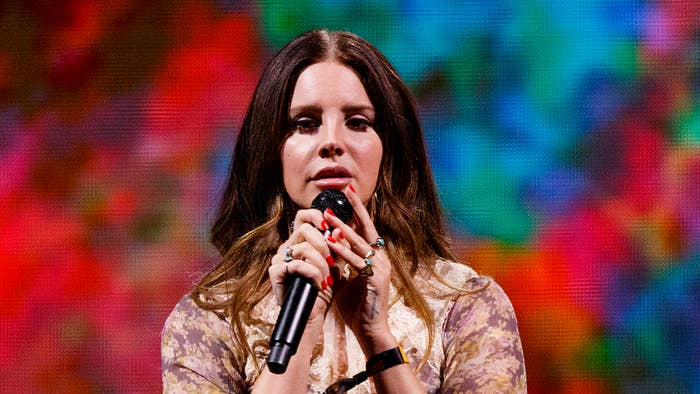
Lana Del Rey has a new album coming this September, but that’s not the reason we’re all talking about her right now. The singer-songwriter decided to tie in an album announcement with a lengthy note on Instagram that outlined the double standards she’s endured in the music industry, while also mentioning several female artists who are currently making waves on the Billboard charts.
Lana has every right to share her thoughts and frustrations regarding the reception of her own work and the treatment of women within the industry, of course, but she undermined her own message by how she presented the letter. If she’s looking to change how “women like her” are treated or perceived, this didn’t help her cause. Ultimately, her open letter missed the mark.
Lana’s first mistake was specifically naming fellow artists, the majority of whom are women of color, to get her point across.
“Now that Doja Cat, Ariana, Camila, Cardi B, Kehlani, and Nicki Minaj, and Beyonce have had number ones with songs about being sexy, wearing no clothes, fucking, cheating, etc - can I please go back to singing about being embodied, feeling beautiful by being in love even if the relationship is not perfect or dancing for money - or whatever I want without being crucified or saying that I’m glamorizing abuse?”
Just last week, Doja Cat, Nicki Minaj, Beyoncé, and Megan Thee Stallion collectively owned the No. 1 and No. 2 positions on the Billboard Hot 100. It was an empowering and unifying moment that proved the power that women have when they work together to break the music industry’s glass ceiling. And whether she intended to or not, name-dropping these women, along with other WOC like Cardi, Kehlani, and Camila Cabello, came across as oddly racially-targeted and seemed to tear down their progress.
Despite her very pointed opening statement, Lana isn’t mad about topping the charts. She’s taking issue with the fact that other women are allowed to explore provocative and controversial subjects in their music, while she is ridiculed for consistently singing about flawed or destructive relationships. “With all of the topics women are finally allowed to explore, I just want to say over the last ten years, I think it’s pathetic that my minor lyrical exploration detailing my sometimes submissive or passive roles has often made people say I’ve set women back hundreds of years,” she wrote.
She’s not wrong in highlighting the heap of criticism she’s received since she released “Blue Jeans” in 2011. Lana has been saddled with the label of a “Hollywood sadcore” artist, and mocked for making indie-pop songs about James Dean-types. In a 2019 review of Del Rey’s album Norman Fucking Rockwell!, for NPR, writer Ann Powers pegged her as “a loyalist to outdated ideals like mad love and bad-boy machismo.” (Lana publicly responded to this review on Twitter, and Powers is likely one of the critics she’s referring to when she writes about “female writers saying that I glamorize abuse”).
By comparing herself with other women who are seeing chart success, Lana angled her letter as if she is the only woman to be chastised for the themes in her music. That is not the case. Ariana’s last two albums, sweetener and thank u, next were heavily focused on her real-life romances, which didn’t go over well with some critics. She was taunted for naming a song after her then-finance Pete Davidson on sweetener and then revolving thank u, next around her messy romantic history. Kehlani’s latest album, It Was Good Until It Wasn’t, has been widely praised by fans, but this hasn’t stopped some from doing a lyrical analysis of songs like “Toxic,” which is believed to be about her rocky relationship with YG. Beyoncé’s Lemonade, which explored infidelity in her marriage among other cultural subjects, was said to be “bad for black women.”
Del Rey’s post also doesn’t mention the female artists who have come before her and are standing right beside her now. She says she feels like she “paved the way for other women to stop putting on a happy face, and just be able to say whatever the hell they wanted to in their music - unlike my experience where if I even expressed a note of sadness in my first two records I was deemed literally hysterical as though it was literally the 1920s.” She might have popularized making sad songs for Coachella teens, but if she checked the history books, she’d see names like Nina Simone, Mary J. Blige, and Keyshia Cole were also singing about the complexities that come with being in relationships that are beautifully painful.
Lana Del Rey says she wants a feminism that makes room for “women who look and act like me - the kind of woman who says no but men hear yes - the kind of women who are slated mercilessly for being their authentic, delicate selves…” The pool of mainstream artists is more diverse than it was 10 years ago, with women finding commercial success with tracks about sex, love, abuse, and mental health, but there is always more work to be done.
Lana’s letter could have been a powerful moment that highlighted areas that still need improvement. But there’s no way that change will be achieved by clawing at others to get there.

